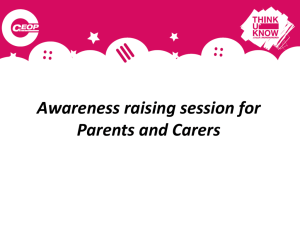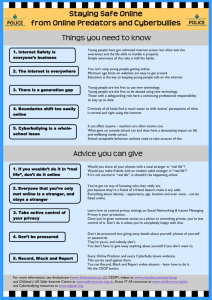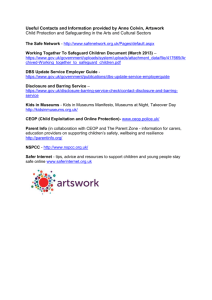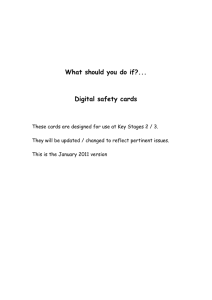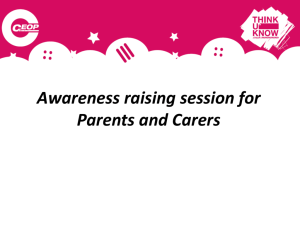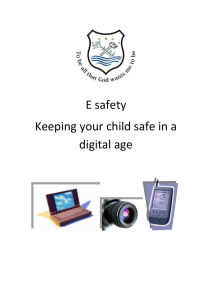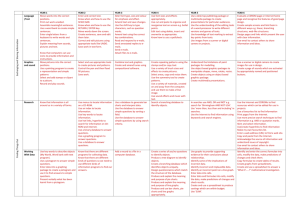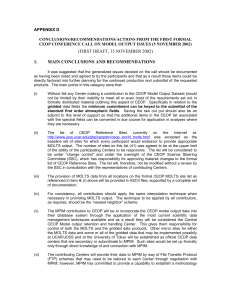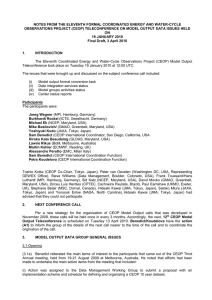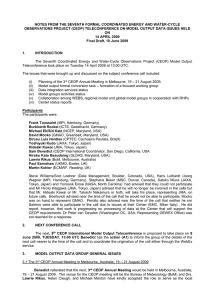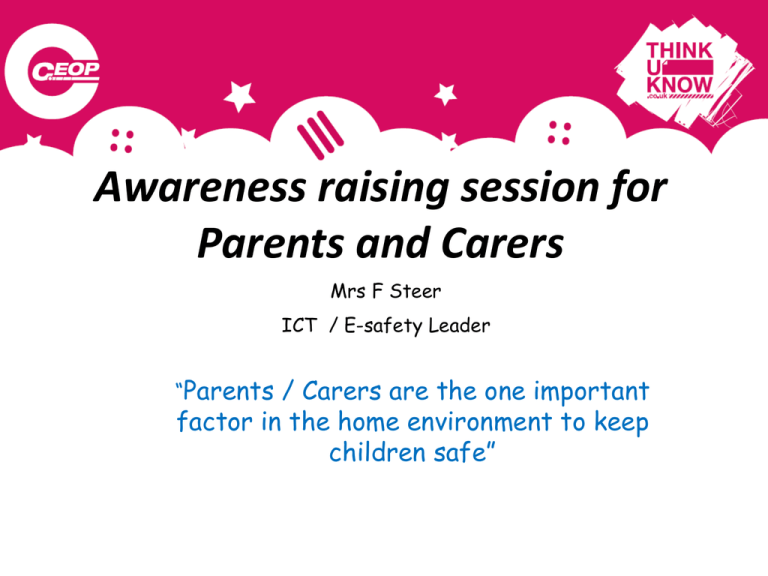
Awareness raising session for
Parents and Carers
Mrs F Steer
ICT / E-safety Leader
“Parents / Carers are the one important
factor in the home environment to keep
children safe”
Digital Natives
vs.
= Digital Divide (Marc Prensky)
Digital Immigrants
What is E-Safety?
• Safeguarding young people (and indeed adults!)
in the digital world.
• Learning to understand and use new technologies
and information communication technology (ICT)
in a positive way.
• NOT about restricting children, but EDUCATING
them about the risks as well as the benefits so
they can feel confident and happy online.
• Being educated to be able to support and help
young people.
Why are we here?
Social Media 2011
[Play film]
Benefits of the Internet
Research
Communication
Email
Online
Banking
Gaming
What can go wrong?
Risks
Unwanted contact/grooming
Cyberbullying
Harmful content/illegal material
Privacy/digital footprints
Websites and Technologies...
Positives, Risks and Actions
Social networking
Instant messaging/BBM
Online gaming
Mobile technology
Social Networking
Facebook Security
Risks
Sharing personal information
Unwanted contact
Unhealthy networking
Inappropriate content
Overuse
Tips
Security settings need to be set to “Friends only”, that includes
- comments, posts and photos
These “Friends” need to be people they know and trust in the
real world
Content - Only post content and photos they wouldn't mind
showing you!
Try your very best to be “Friends” with your child on Facebook
Is my child too young to have a Facebook
account?
• Help set up their profile
• Add your email as the main contact (if possible)
• Set the privacy settings to “friends” only and ensure they are
children you know
• Show them a CEOP safety resource which outlines the risks
(www.youtube.co.uk/ceop/jigsaw)
• ‘Like’ the Click CEOP page
• Check in and keep updated
The Child Exploitation and Online
Protection Centre
CEOP is the UK national lead agency who deal with the
sexual exploitation of children in the UK and abroad
www.ceop.police.uk
www.facebook.com/ceop
Watch Consequences
Instant Messaging and Private Chat
Tips
Ask your child to never accept people they don’t know and trust in the real
world
Inform them that giving out personal information can be dangerous. They
need to treat personal information such as the school they go to or their
location like their tooth brush and not share it with anyone!
Ask them not to webcam with people they do not know from the real world
and turn the webcam off after use!
Teach them how to report a problem and delete people that make them feel
uncomfortable
Gaming
Tips
Leave all gaming devices in a family space
Open up communication - talk to your child about the sites they are using and
why they like them
Explain that people lie online and they are not always who they say they are
Explain that people can be mean online and don’t always have their best interests
at heart
Ask them to never give out personal information
Set parental controls
Set time limits on how long they can game for. Allow time for non-technology
based activities and allow an hour ‘screen free’ time before bed
PEGI
PEGI (The Pan-European Game Information age rating system) was established in
2003 to help European parents make informed choices
Violence - Game contains depictions of violence
Discrimination - Game contains depictions of, or material which may
encourage, discrimination
Sex - Game depicts nudity and/or sexual behaviour or sexual references
Drugs - Game refers to or depicts the use of drugs
Fear - Game may be frightening or scary for young children
Bad Language - Game contains bad language
Mobile Technology
Functions
Chat
Location
Tips
Is my child old enough to have a mobile phone? Set boundaries
Before buying your child a mobile, find out what functions it has – Internet, private
messaging, built in applications
Set parental controls where required
Set mobile rules - no mobile phone in the bedroom at night, mobile free time
before bed, no use after lights out
Support and Report
Report suspected online grooming – this could
sexual chat, a child being asked to do
something that makes them feel uncomfortable
or someone insisting on meeting up
www.ceop.police.uk
Peer to peer support network for young people who
are being bullied
www.cybermentors.org.uk
Watch Tom’s Story
www.thinkuknow.co.uk/parents
5-7
8-10
11-16
www.thinkuknow.co.uk
www.youtube.co.uk/ceop
SEN
Click CEOP
New site check list
What can you do? - Functions of the site or
technologies
Is there any parental information available?
How do you report a problem?
Can the account/profile be made private?
Does it have any parental controls?
Parental controls
How can they help?
Block sites that are not age appropriate
limit inappropriate and illegal material
Set timings – automatic switch off at bedtime
Monitor activity
Simple steps to
protection
I have asked my child to show me sites they use
I have asked my child to set the security settings on all the
technologies they use
I have asked my child to only accept people they know and trust
in the real world as online “Friends”
I have set safe settings on our computer/laptop and set adult
content filters on my child’s smart phone
My child has agreed to tell me if they are worried about
something online
Questions???
Thank you

